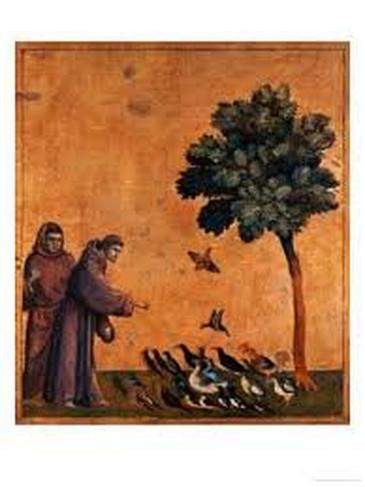|
Rob Stucky, Retreat Leader Imagine living in a town where rival parties intermittently break out in local gang wars and include neighboring cities. The private armies of various kings and nobles sweep through town periodically, taking freely from the local populace as compensation for fighting the nobles’ battles. Consider too that the Church is an active participant in this jockeying for power and control. There is an ongoing competition for dominance between Church and State. And yet the arts thrive, and cities vie with each other not just their military and economic conquests, but also for their cultural achievements. Welcome to the dynamic of Assisi and the Italian Península in the XII and XIII centuries! Fast forward eight hundred years, and in some ways the pattern seems the same. The gangs have changed to syndicates, the armies are corporate, and the politicians have replaced the nobles, yet each considers “doing our thing”, to be sanctioned by the rightness of their particular preferences. And most people either get totally caught up in the turmoil of it all, or try to run away from reality, living in denial, and run themselves ragged either way! Just living in a world of such tensions can put our minds into hyper-drive, and stress becomes our greatest health risk. But we don’t have to be victimized by such behaviors. We always have a choice. Sooner or later, we get fed up with this self-defeating and self-perpetuating pattern, and feel driven to seek a healthier, more satisfying alternative. Beginning that search is the axial point on which the transformation of our experience depends. This is precisely what Saint Francis did by committing himself to a life of radical simplicity, of profoundly compassionate humanity, and of fundamental internal receptivity to a higher purpose and will. His example of ultimate connectedness, through ego transcendence, cut through the illusions of both the religious and secular worlds in which he lived. His life and teaching revealed the joyful alternative of the ego’s surrender to Divine Providence, rather than to the conditional and unreliable providence of either Church or State.
The lesson remains true even today. The key to Francis’ inner freedom, and his legacy to humanity was to learn to listen, to learn to not be so reactive, to get out of his head and into his heart, In this way he was guided by a higher will than his own. There is a wonderful story that Francis and his most devoted companion, Brother Leo, were walking down the road one day and came to a crossroads. Leo was filled with evangelical zeal to preach the Gospel to people in need, so it seemed imperative to pick the right road to reach those most deserving of the message. He asked Francis, “Which fork should we take?” Francis, who was nearly blind himself, told Leo to stand in the middle of the crossroads, close his eyes, and spin around until he told him to stop. Leo was surprised, but obeyed. When Francis finally said “Stop!” they followed the road Leo ended up facing! The road to fulfillment lies ahead. Learning to be guided to it by surrendering the ego’s attachments is what is called spiritual practice.
5 Comments
10/27/2022 02:05:41 pm
Thanks for sharing the article, and more importantly, your personal experience of mindfully using our emotions as data about our inner state and knowing when it’s better to de-escalate by taking a time out are great tools. Appreciate you reading and sharing your story since I can certainly relate and I think others can to
Reply
Wow, this concept of 'radical simplicity' really resonates with me when I think about the historical context described here in Assisi and the Italian Peninsula during the 12th and 13th centuries. It's remarkable how amidst all the chaos and power struggles between rival parties, the Church, and the state, the arts and culture managed to thrive. This reminds me of the idea that sometimes, simplicity can be a source of strength. The people of that time must have found solace and inspiration in the pursuit of cultural achievements amidst adversity. It's a testament to the human spirit's resilience and the enduring power of creativity.
Reply
11/2/2023 03:48:30 am
Living in Assisi during the 12th and 13th centuries must have been an intense experience, with rival parties and private armies vying for control, all while the Church and State competed for dominance. It's fascinating how amidst all this chaos, the arts continued to flourish and cities aimed for cultural excellence alongside their military and economic endeavors.
Reply
12/28/2023 08:36:23 am
The concept of radical simplicity resonates with me deeply. It's about finding joy in the essentials and cutting out the noise. In today's fast-paced world, it's more important than ever to simplify our lives and reduce stress. I'm looking forward to delving into the discussions and strategies for achieving radical simplicity and a more fulfilling life.
Reply
2/8/2024 04:39:10 pm
It's wonderful to hear that the concept of radical simplicity resonates with you! In a world filled with constant distractions and demands, embracing simplicity can indeed lead to a more fulfilling and less stressful life. By focusing on the essentials and cutting out the unnecessary noise, we can create space for what truly matters to us.
Reply
Leave a Reply. |
AuthorEntries are from our Community of Retreat leaders that provide year round retreats in Assisi, Italy Archives
September 2018
Categories |
We are a non-profit organization that supports people of all religions, countries and backgrounds to live a deeply satisfying spiritual life.
The path of great love and peace is to pursue a life full of heart that includes; devotion, simplicity, humility and service to others.
Assisi Retreats | Via San Paolo 11 | 06081 Assisi (PG), Italia | +39.392.230.1626 | © since 1985
Silent Stay Meditation Center Santa Barbara, California www.SilentStay.com
P: 805.329.1553 | Spring Grove Inc. 501(c)(3) non-profit
© since 1986 - present


 RSS Feed
RSS Feed